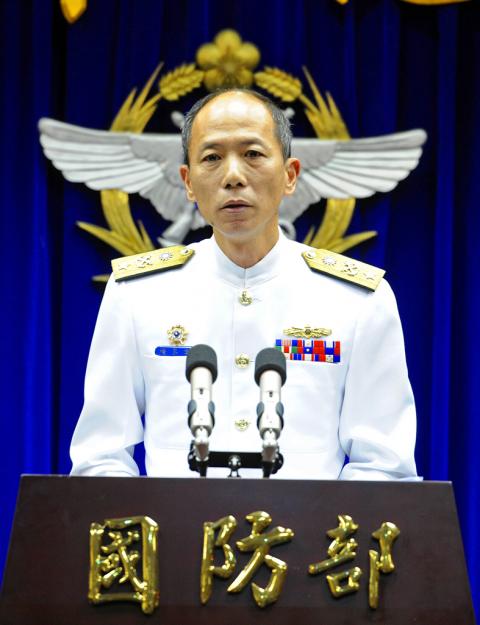The military is for the first time to incorporate cyberwarfare and civilian planes in its annual Han Kuang series of exercises later this month at various air bases and maritime areas.
The exercises will include drills centered on military personnel, equipment and aircraft to test joint combat capabilities of the air force, navy and army in case of an attack by China, Rear Admiral Mei Chia-shu (梅家樹) said.
As part of the exercise, the cyberwarfare drill is to test the military’s abilities to restore hobbled facilities, Mei said during a Ministry of National Defense press conference yesterday.

Photo: George Tsorng, Taipei Times
Live-fire drills will be held in waters off the eastern coast, south of Penghu, as well as in areas in Pingtung County, to test defensive capabilities, he said.
Exercises involving several civilian planes are to transport soldiers from Greater Kaohsiung to Penghu County to test readiness for wartime maneuvers, another military official said.
The Han Kuang exercises this year will last from Sept. 15 to Sept. 19 at designated sites, ministry spokesman Major General David Lo (羅紹和) said.
There will be drills to practice emergency takeoffs and landings for fighter jets on the Minsyong section of the Sun Yat-sen Freeway (Freeway No. 1), which passes through Chiayi County, said Major General Li Ting-sheng (李廷盛), director of the air force’s Combat Readiness Training Division.
Aircraft used in the drill this month will include F16-A/Bs, Mirage 2000-5s and Indigenous Defense Fighters (IDF), as well as the E-2K airborne early warning aircraft, a CH-47 helicopter, an OH-58D reconnaissance helicopter and two AH-1W Super Cobra attack helicopters, Li said.
The exercises this year are to simulate an attack from China that destroys Taiwan’s air force bases, leaving the military to rely on the freeway for emergency takeoffs and landings, he said.
It is also to test the military’s ability to conduct refueling and re-supply operations in times of war, Li added.
To conduct the drill, the section of the freeway between the Chiayi and Dalin exits will be closed for 11 hours beginning at midnight on Sept. 16.
Meanwhile, a new weapon, known as the “Wanjian missile” (萬劍彈), is reportedly ready for production after being developed for many years by the ministry.
Chinese Nationalist Party (KMT) Legislator Lin Yu-fang (林郁方) yesterday confirmed the news about the weapon, which is designed to destroy enemy runways.
Developed at a cost of about NT$3 billion (US$100 million), the Wanjian cruise missile system will go into production next year, after passing initial combat testing trials recently, Lin said.
The missile contains hundreds of cluster bomblets to maximize damage to runways, while it can also be used against other enemy targets, including harbors, military encampments, radar systems and missile launch installations.
“Our IDF jets have been configured to carry the Wanjian missiles and can reach targets within 300km. This has improved the air-to-land attack capability to greater than that of the F16-A/B jets and expanded the air force’s attack range for coastal military installations in China,” Lin said.
He added that 40 IDF jets were outfitted to carry Wanjian missiles by the end of last year, and eventually all the nation’s 127 IDF jets will be configured for such capability.
Additional reporting by CNA

The Taiwanese passport ranked 33rd in a global listing of passports by convenience this month, rising three places from last month’s ranking, but matching its position in January last year. The Henley Passport Index, an international ranking of passports by the number of designations its holder can travel to without a visa, showed that the Taiwan passport enables holders to travel to 139 countries and territories without a visa. Singapore’s passport was ranked the most powerful with visa-free access to 192 destinations out of 227, according to the index published on Tuesday by UK-based migration investment consultancy firm Henley and Partners. Japan’s and

NATIONAL SECURITY THREAT: An official said that Guan Guan’s comments had gone beyond the threshold of free speech, as she advocated for the destruction of the ROC China-born media influencer Guan Guan’s (關關) residency permit has been revoked for repeatedly posting pro-China content that threatens national security, the National Immigration Agency said yesterday. Guan Guan has said many controversial things in her videos posted to Douyin (抖音), including “the red flag will soon be painted all over Taiwan” and “Taiwan is an inseparable part of China,” while expressing hope for expedited “reunification.” The agency received multiple reports alleging that Guan Guan had advocated for armed reunification last year. After investigating, the agency last month issued a notice requiring her to appear and account for her actions. Guan Guan appeared as required,

Japan and the Philippines yesterday signed a defense pact that would allow the tax-free provision of ammunition, fuel, food and other necessities when their forces stage joint training to boost deterrence against China’s growing aggression in the region and to bolster their preparation for natural disasters. Japan has faced increasing political, trade and security tensions with China, which was angered by Japanese Prime Minister Sanae Takaichi’s remark that a Chinese attack on Taiwan would be a survival-threatening situation for Japan, triggering a military response. Japan and the Philippines have also had separate territorial conflicts with Beijing in the East and South China

A strong cold air mass is expected to arrive tonight, bringing a change in weather and a drop in temperature, the Central Weather Administration (CWA) said. The coldest time would be early on Thursday morning, with temperatures in some areas dipping as low as 8°C, it said. Daytime highs yesterday were 22°C to 24°C in northern and eastern Taiwan, and about 25°C to 28°C in the central and southern regions, it said. However, nighttime lows would dip to about 15°C to 16°C in central and northern Taiwan as well as the northeast, and 17°C to 19°C elsewhere, it said. Tropical Storm Nokaen, currently